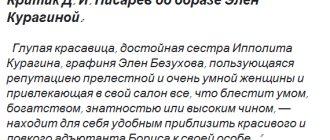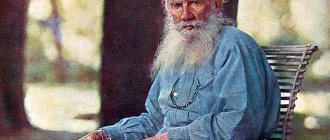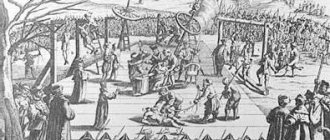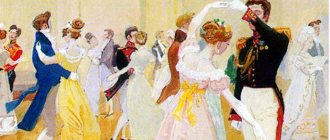Characteristics of Platon Karataev
Platon Karataev is not the main character of the novel, he is a simple soldier, and in the past a peasant, but in his image L.N. Tolstoy embodied everything sincere, kind, and bright that was characteristic of a Russian person and that the educated Count Bezukhov lacked. In a secular society, it was impossible not only to acquire these qualities, but also to comprehend the simple truths that all of Tolstoy’s favorite heroes, including Pierre Bezukhov, strive for.
Appearance
Plato's appearance is peculiar. He was already more than fifty years old, but there was not a single gray hair in his hair or beard, although in the 19th century. people of this age were already considered old. However, he himself does not know exactly his age. His entire appearance seemed round, without sharp features or prominent details in his face and entire figure. Even his hands seemed round, because he always held them as if at any moment he was ready to hug someone. He exuded a special gentleness and calmness.
His short stature and broad shoulders further emphasized the roundness of his figure, and his brown eyes were filled with light and warmth. Even the wrinkles on his face were rounded, giving him “an expression of innocence and youth...”.
Pierre liked Platon Karataev’s voice - pleasant, melodious and affectionate. He himself was affectionate with everyone who surrounded him, even with the French and with a stray dog.
Life path
Platon Karataev came from a wealthy peasant family. He was married, but his only daughter died in early childhood. He joyfully recalls his peasant life: “Our patrimony is rich, there is a lot of land, the men live well, and our home, thank God...” He became a soldier by accident: he was cutting down wood in someone else's grove, was caught and sent to become a soldier. But he even considered this a good thing, because... thereby helping out his younger brother, who was supposed to be recruited as a soldier, but he had a large family. Plato came to terms with the soldier's life, although he really missed his village.
He took part in several military campaigns, ended up in a hospital in Moscow, but when the city surrendered he was captured by the French. When the French left Moscow, they drove the prisoners after their army, but Platon Karataev could not withstand the difficult campaign: he weakened, fell ill and was killed by the French.
Character
The main feature of Platon Karataev is kindness to all people in the world, to the whole world. He immediately saw Pierre’s confusion and helplessness in the circumstances of captivity and began to help him: he fed him baked potatoes, calmed him down, talked about his life in order to dispel his despair.
Plato's speech was fast, figurative, he often used sayings, proverbs, and loved to sing. Tolstoy notes that he sang as birds sing - freely, without regard to the fact that someone is listening to him.
Platon Karataev was simple, never showed bitterness towards others, even towards enemies, and never condemned anyone. He was characterized by the spirit of truth-seeking, spiritual clarity, and love of work. Tolstoy points out that Karataev “knew how to do everything...”. He constantly helped others.
He accepted everything that happened in his life without complaining, considering it God’s providence: joy came - rejoice, suffering overcame - endure, do not complain. To fight evil with force means to give birth to new evil. Only a morally healthy person could reason this way. He was never sad about anything. He had no enemies.
Platon Karataev did not tend to think about high feelings; he did not suffer from reflection, which was typical for people of the world: Bolkonsky or Bezukhov. “... Karataev had no attachments, friendship, love, as Pierre understood them; but he loved and lived lovingly with everything that life brought him to, and especially with a person - not with some famous person, but with those people who were before his eyes...” He had no contradictions either with himself or with those around him. He never suffered from something that could not be changed. This, of course, is Tolstoy’s well-known theory of non-resistance to evil through violence, but such a philosophy was characteristic of a part of the Russian peasantry. Karataev's fatalism became a discovery and reassurance for Pierre.
And Karataev transferred the habits of a peasant worker into his military life: he was always busy with something, helping others.
The meaning of the image of Platon Karataev
The image of Platon Karataev in the novel is of great importance not only for the search for the spiritual meaning of Pierre Bezukhov’s life, but also for Tolstoy’s ability to show the peasant’s worldview that he idealized, his vitality. In the life of this simple peasant, Pierre saw for himself the simple path that he had been looking for for so long. Tolstoy revealed to Pierre the inner world of ordinary people, peasants, which was impossible to do under ordinary living conditions - there was too much of a gap between secular people and the people. But in captivity, Count Bezukhov lives the same life as the peasant, shares the same fate with him, sees his interests, observes his behavior. Pierre believes that Platon Karataev had a great influence on him. But what is it? Pierre could not explain this even to Natasha, although it was important for him to tell her about Karataev. He began this story, but interrupted him: “No, you cannot understand what I learned from this illiterate man - a fool.”
But the reader understands what exactly attracted Pierre: Karataev’s calmness and his great inner strength, which is called the spirit of the people, it was this strength that was revealed to Pierre and helped him take the path that he was looking for for himself. Pierre Bezukhov gains faith in goodness, he develops a desire to help his neighbor. Now he has found a way of life for himself, devoid of the vices of high society. Thanks to Karataev, “the previously destroyed world now moved in his soul with new beauty, on some new and unshakable foundations.” In the minds of Pierre, Platon Karataev became the personification of the “spirit of simplicity and truth.”







